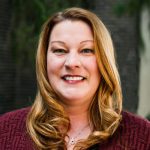Teaching and Learning with Global Neighbors – Faculty Spotlight, Kimberly Kester
Posted in: NewsSince fall of 2021, Missouri has recently welcomed close to 2,000 Afghan refugees. Several members of the Mizzou Academy faculty are involved in resettlement and welcoming efforts. This month, we want to highlight Kimberly Kester’s work teaching an English class to a group of Afghan refugee women in the Joplin, Missouri area.

Ms. Kester shared that in her class, “There are eight women and many children. As newcomers who have lived through trauma, navigating these early needs is multi-layered. Before we work on academic learning, we have to focus on food and shelter. Access to educational resources is a cultural difference that I think is easy for us to take for granted in the United States. For example, only two of the women I am working with are literate in their native language, Pasto or Dari. Most have never had the opportunity to hold a pencil or write their own name until our class. To add to the challenge, Pasto and Dari use Arabic script and are read and written from right to left.”
Like several on the Mizzou Academy team, Ms. Kester has a strong background in supporting multilingual learners. Her experience teaching English learners spans from kindergarten through university. She has worked with newcomers to those preparing for standardized proficiency tests. Her passion for literature and language comes through in her teaching techniques, which focus on making connections between texts, the students’ lives, and the world as a whole.
In her own words, Ms. Kester says that her “goal in the classroom is to demonstrate respect for all cultures and backgrounds in order to facilitate equal opportunities in learning for everyone.”
As a global school, the Mizzou Academy student population represents incredible cultural and linguistic diversity. Over the past five years, they have welcomed students from over 40 countries of origin.
Stephanie Walter, the Director of Teaching and Learning, says, “We are proud to work with international partners and celebrate the relationships and connections we form. Our faculty, staff, and students also engage in intentional world language learning through travel, conversations, and language exploration—as well as through the 23 different languages to study at Mizzou Academy. Teaching requires intentionality, compassion, and bridge building.”
Over the past couple years, Ms. Walter and Executive Director Dr. Kathryn Fishman-Weaver have been researching connected teaching practices in the global and blended classroom. Fishman-Weaver says, “Our research with educators and scholars from around the globe is exciting. It points to a belief that connected teaching and learning can pave the way to a more just and inclusive world.”
For faculty and staff, like Kimberly Kester, this commitment extends beyond their Mizzou Academy classrooms. It is a practice that calls her to welcome new neighbors and make connections to her local community.
Kester lights up when speaking about the students in her English class, “These women inspire me.” She says, “They are strong. They are survivors. They are dedicated. Some came with six or seven children. All came to a country where everything is new. I hope to have a small role in supporting them in this new home. We’re starting with tea and learning everyone’s names.”
Shortly after running an earlier version of this story, Ms. Kester learned that her class would be receiving eight new students. She shared that she is readying herself “with two important lessons. The first is that a smile can go a long way and the second is that care is universal.”
| As part of our strategic planning process, the Mizzou Academy team has engaged in intentional work around articulating our core values. These values are partnership, innovation, access, and inclusion. Over the next year, we will be sharing stories that highlight these values. We are proud to share a faculty spotlight on Lead Teacher, Kimberly Kester for her work around inclusion. | |
| Belief | Diversity, inclusion, equity, and representation are vital to effective school communities. |
| Guiding Question | How can we cultivate a safe space and center a multiplicity of perspectives? |